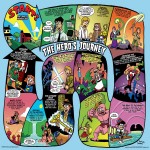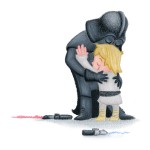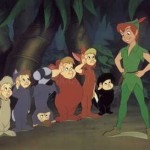 When you’ve seen as many movies as I have, you begin to see that they all follow a certain pattern. This is true not just of movies, but of all great stories ranging from those found in classic mythology and literature to modern TV series and video games. Joseph Campbell called it the monomyth or hero’s journey. It’s basically a series of steps that the protagonist must go through during the course of his or her adventure. In addition to this, there are also a number of spiritual principles that often find their way into storytelling. By combining these principles with the monomyth, you can pretty much figure out where just about any story is headed. While this skill has proven to be incredibly annoying to my wife, it’s come in very handy for me. Not because I’ve continually annoyed her with my usually correct movie and TV show predictions, but because I’ve noticed that these storytelling rules apply to more than just fictitious stories. They also apply to real life.
When you’ve seen as many movies as I have, you begin to see that they all follow a certain pattern. This is true not just of movies, but of all great stories ranging from those found in classic mythology and literature to modern TV series and video games. Joseph Campbell called it the monomyth or hero’s journey. It’s basically a series of steps that the protagonist must go through during the course of his or her adventure. In addition to this, there are also a number of spiritual principles that often find their way into storytelling. By combining these principles with the monomyth, you can pretty much figure out where just about any story is headed. While this skill has proven to be incredibly annoying to my wife, it’s come in very handy for me. Not because I’ve continually annoyed her with my usually correct movie and TV show predictions, but because I’ve noticed that these storytelling rules apply to more than just fictitious stories. They also apply to real life.
 You’ve seen it hundreds of times. Some guy is being interviewed by the local news after he helped prevent some crime or rescued someone in distress. The reporter asks, “Do you consider yourself a hero?” Apparently, this question must be asked in order to test whether or not said person is in fact a hero. According to local news rules of heroism, the man is only a hero, if and only if, he claims to not be one. Most people, knowing this rule, go on to say that they don’t consider themselves to be a hero because they just did what anyone in their situation would’ve done. The reporter then cuts back to the anchorpeople who disagree with the man’s assessment. Feeling that the hero test was passed, they comment about what a true hero the man is while a colorful “local hero” graphic displays besides them. Personally though, I agree with the guy. He’s not a hero.
You’ve seen it hundreds of times. Some guy is being interviewed by the local news after he helped prevent some crime or rescued someone in distress. The reporter asks, “Do you consider yourself a hero?” Apparently, this question must be asked in order to test whether or not said person is in fact a hero. According to local news rules of heroism, the man is only a hero, if and only if, he claims to not be one. Most people, knowing this rule, go on to say that they don’t consider themselves to be a hero because they just did what anyone in their situation would’ve done. The reporter then cuts back to the anchorpeople who disagree with the man’s assessment. Feeling that the hero test was passed, they comment about what a true hero the man is while a colorful “local hero” graphic displays besides them. Personally though, I agree with the guy. He’s not a hero.
 Those who move in spiritual circles often talk about how we are all connected, that our thoughts create our future reality, and that the universe provides us with clues about our direction in life. Personally, I look at spiritual principles as scientific rules that we just don’t understand yet. Not too long ago, the idea that people could get sick from tiny bugs they couldn’t see or that invisible waves could carry images or music was thought to be magical thinking, until science proved it to be true. So if these spiritual principles are indeed a rule of our universe, there should be a way to test and predict their occurrence. Doing this on an individual scale might prove challenging though, since one person’s thoughts may not have enough energy to make something manifest in a testable way. But what if there were an event that millions of people were focusing on, and this event inspired heated, emotionally charged thoughts that could result in only one of two possible outcomes? If only we had such an event, why, we just might be able to predict the future on a grand scale!
Those who move in spiritual circles often talk about how we are all connected, that our thoughts create our future reality, and that the universe provides us with clues about our direction in life. Personally, I look at spiritual principles as scientific rules that we just don’t understand yet. Not too long ago, the idea that people could get sick from tiny bugs they couldn’t see or that invisible waves could carry images or music was thought to be magical thinking, until science proved it to be true. So if these spiritual principles are indeed a rule of our universe, there should be a way to test and predict their occurrence. Doing this on an individual scale might prove challenging though, since one person’s thoughts may not have enough energy to make something manifest in a testable way. But what if there were an event that millions of people were focusing on, and this event inspired heated, emotionally charged thoughts that could result in only one of two possible outcomes? If only we had such an event, why, we just might be able to predict the future on a grand scale!
 Have you been feeling a bit dizzy lately? Does time feel like it’s been flying by faster than ever? Experiencing ringing in your ears? Seeing flashes of light or fleeting glimpses of things that aren’t there? If you’re not head-over heels in love, pregnant, or smokin’ da ganja, you may be going through what’s known as ascension symptoms. What are they, why are they happening, what do they mean, and will they ever go away? If you’d like answers to questions like these, the latest installment of Layman just might be the prescription you’ve been looking for.
Have you been feeling a bit dizzy lately? Does time feel like it’s been flying by faster than ever? Experiencing ringing in your ears? Seeing flashes of light or fleeting glimpses of things that aren’t there? If you’re not head-over heels in love, pregnant, or smokin’ da ganja, you may be going through what’s known as ascension symptoms. What are they, why are they happening, what do they mean, and will they ever go away? If you’d like answers to questions like these, the latest installment of Layman just might be the prescription you’ve been looking for.
 Have you seen them? They’re everywhere: in movies and TV shows, on ads and product packaging, in architecture, design, floor patterns, the Olympics, online, and even on the paper wrapped around hero sandwiches. They are honeycombs and hexagons, and they are taking over. Sure, design styles come and go, but why has this one seemed to have popped up so suddenly, become so incredibly prolific, and been so invisible to so many? Of course, now that you’re in the know, you’ll begin seeing them too (if you haven’t already). The question is why are they here, what do they mean, and why should you care?
Have you seen them? They’re everywhere: in movies and TV shows, on ads and product packaging, in architecture, design, floor patterns, the Olympics, online, and even on the paper wrapped around hero sandwiches. They are honeycombs and hexagons, and they are taking over. Sure, design styles come and go, but why has this one seemed to have popped up so suddenly, become so incredibly prolific, and been so invisible to so many? Of course, now that you’re in the know, you’ll begin seeing them too (if you haven’t already). The question is why are they here, what do they mean, and why should you care?
 The first time I was given advice about the importance of forgiveness was at the most unlikely of places: an advertising school I was attending in Atlanta. The school had brought in speaker Joey Reiman—a very successful advertising executive who ran his own agency. Almost immediately, I could tell this man had a lot of wisdom, but it was towards the end of his presentation when something he said really resonated with me.
The first time I was given advice about the importance of forgiveness was at the most unlikely of places: an advertising school I was attending in Atlanta. The school had brought in speaker Joey Reiman—a very successful advertising executive who ran his own agency. Almost immediately, I could tell this man had a lot of wisdom, but it was towards the end of his presentation when something he said really resonated with me.
 Disney taught us that, “when you wish upon a star, your dreams come true.” Unfortunately, if your dream is to have both of your parents live to see you succeed, you’re sheer out of luck. In fact, of Disney’s forty full-length animated features from 1937 until 2000, I know of only one where the protagonist’s parents remain alive for the entire film.* Then there’s the fact that just about every super-powered hero is an orphan. If this isn’t bad enough, one or both of the hero’s adoptive parents often dies too! Superman lost his adoptive dad, Spider-Man lost his uncle, and Luke Skywalker lost both his aunt and uncle. With the Amazing Spider-Man movie set for release this summer, and that movie actually exploring the mysterious back-story about Peter Parker’s real parents, I thought it would be a good time to delve into the topic of why so many of our heroes—both super and animated—are orphans, and what the message means for all of us.
Disney taught us that, “when you wish upon a star, your dreams come true.” Unfortunately, if your dream is to have both of your parents live to see you succeed, you’re sheer out of luck. In fact, of Disney’s forty full-length animated features from 1937 until 2000, I know of only one where the protagonist’s parents remain alive for the entire film.* Then there’s the fact that just about every super-powered hero is an orphan. If this isn’t bad enough, one or both of the hero’s adoptive parents often dies too! Superman lost his adoptive dad, Spider-Man lost his uncle, and Luke Skywalker lost both his aunt and uncle. With the Amazing Spider-Man movie set for release this summer, and that movie actually exploring the mysterious back-story about Peter Parker’s real parents, I thought it would be a good time to delve into the topic of why so many of our heroes—both super and animated—are orphans, and what the message means for all of us.
 In a New York Press article from August, 2011, film producer and director Tommy Pallotta, said, “I am a fan of audience participation, but I also think audiences like to be told a story. There’s this thing video game designers call a ‘golden path’—there’s a definite way that the majority of people are going to experience the game, and the designers plot that. A lot of the interactivity in a video game is really just the illusion of interactivity. It’s about engaging the audience and giving at least the feeling of volition. But as the artist you have the sense that you are, in some way, controlling it, blending the craft of storytelling with the illusion of agency.” In other words, in a game you think you are controlling the action, but really it’s already been pre-programmed. Kind of like what we think of as destiny. In fact, maybe that’s exactly what destiny is: the path we are meant to take in order to have the most fulfilling experience.
In a New York Press article from August, 2011, film producer and director Tommy Pallotta, said, “I am a fan of audience participation, but I also think audiences like to be told a story. There’s this thing video game designers call a ‘golden path’—there’s a definite way that the majority of people are going to experience the game, and the designers plot that. A lot of the interactivity in a video game is really just the illusion of interactivity. It’s about engaging the audience and giving at least the feeling of volition. But as the artist you have the sense that you are, in some way, controlling it, blending the craft of storytelling with the illusion of agency.” In other words, in a game you think you are controlling the action, but really it’s already been pre-programmed. Kind of like what we think of as destiny. In fact, maybe that’s exactly what destiny is: the path we are meant to take in order to have the most fulfilling experience.
 In the penultimate episode of Lost, “What They Died For,” Jacob tells the surviving Losties why he chose them as candidates: “I chose you because you were all alone. You were all looking for something that you couldn’t find out there. I chose you because you needed this place as much as it needed you.” This explanation really resonated with me, on one hand because it provided a mythologically sound answer to the main question I’ve always had about Lost: why do all these characters have major issues? And having that answer provided the other reason I really liked the explanation: I immediately understood that while Jacob was addressing the remaining candidates, he was really speaking to us.
In the penultimate episode of Lost, “What They Died For,” Jacob tells the surviving Losties why he chose them as candidates: “I chose you because you were all alone. You were all looking for something that you couldn’t find out there. I chose you because you needed this place as much as it needed you.” This explanation really resonated with me, on one hand because it provided a mythologically sound answer to the main question I’ve always had about Lost: why do all these characters have major issues? And having that answer provided the other reason I really liked the explanation: I immediately understood that while Jacob was addressing the remaining candidates, he was really speaking to us.
 In “Across the Sea,” Lost finally gives us the origins story for Jacob and the Man In Black. The episode was pure, 100% mythology. Those who watched the episode based on the surface story alone were probably disappointed. Let’s face it, taken literally, myths are silly: talking snakes, little boys defeating giants, jealous gods, immaculate conceptions, mortals with superpowers, a sword stuck in a stone, the Force, Never Never Land, Wonderland, Oz, the Matrix, the Island. On the surface, all myths seem like children’s stories. It’s only when we dig deeper that we find the truth worthy of a wise old soul—a soul that knows where it really came from.
In “Across the Sea,” Lost finally gives us the origins story for Jacob and the Man In Black. The episode was pure, 100% mythology. Those who watched the episode based on the surface story alone were probably disappointed. Let’s face it, taken literally, myths are silly: talking snakes, little boys defeating giants, jealous gods, immaculate conceptions, mortals with superpowers, a sword stuck in a stone, the Force, Never Never Land, Wonderland, Oz, the Matrix, the Island. On the surface, all myths seem like children’s stories. It’s only when we dig deeper that we find the truth worthy of a wise old soul—a soul that knows where it really came from.
 When you’ve seen as many movies as I have, you begin to see that they all follow a certain pattern. This is true not just of movies, but of all great stories ranging from those found in classic mythology and literature to modern TV series and video games. Joseph Campbell called it the monomyth or hero’s journey. It’s basically a series of steps that the protagonist must go through during the course of his or her adventure. In addition to this, there are also a number of spiritual principles that often find their way into storytelling. By combining these principles with the monomyth, you can pretty much figure out where just about any story is headed. While this skill has proven to be incredibly annoying to my wife, it’s come in very handy for me. Not because I’ve continually annoyed her with my usually correct movie and TV show predictions, but because I’ve noticed that these storytelling rules apply to more than just fictitious stories. They also apply to real life.
When you’ve seen as many movies as I have, you begin to see that they all follow a certain pattern. This is true not just of movies, but of all great stories ranging from those found in classic mythology and literature to modern TV series and video games. Joseph Campbell called it the monomyth or hero’s journey. It’s basically a series of steps that the protagonist must go through during the course of his or her adventure. In addition to this, there are also a number of spiritual principles that often find their way into storytelling. By combining these principles with the monomyth, you can pretty much figure out where just about any story is headed. While this skill has proven to be incredibly annoying to my wife, it’s come in very handy for me. Not because I’ve continually annoyed her with my usually correct movie and TV show predictions, but because I’ve noticed that these storytelling rules apply to more than just fictitious stories. They also apply to real life.










